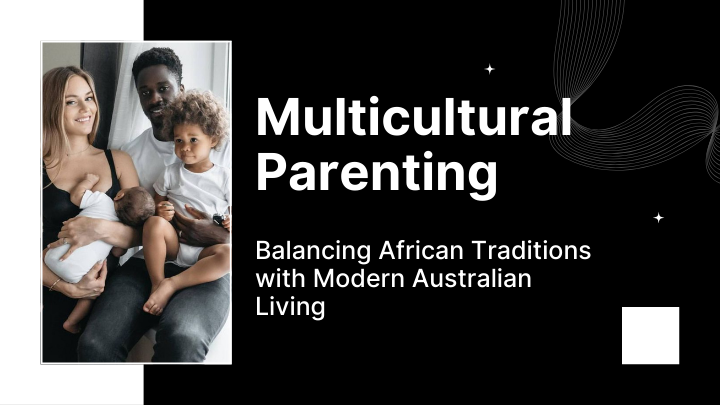Multicultural Parenting
Parenting in a multicultural household is a beautiful journey, filled with unique challenges and enriching experiences. For families who are navigating the blending of African traditions with modern Australian living, it’s a chance to raise children who are connected to their roots while also embracing the diversity and opportunities that life in Australia offers. This balance between honoring cultural heritage and integrating into mainstream society can foster well-rounded individuals with a strong sense of identity, respect for others, and adaptability.
If you are raising children in a multicultural environment, here are some tips to help you navigate the complexities of blending African traditions with modern Australian living, creating a rich cultural experience for your family.
1. Celebrate Both Cultures: Honor African Heritage and Embrace Australian Values
One of the most important aspects of multicultural parenting is teaching children to appreciate and honor both cultures. In an African-Australian household, this might mean celebrating African holidays and festivals while also participating in Australian traditions and festivities.
How to Celebrate Both Cultures:
- Incorporate African Holidays: Celebrate significant African holidays like Kwita Izina (Rwandan Naming Ceremony), Diwali (Ugandan and Kenyan communities), or Nguzo Saba (celebrating African American culture). Teach your kids the stories, songs, and dances associated with these holidays.
- Participate in Australian Festivals: Engage with local Australian holidays like Australia Day, ANZAC Day, and Christmas. Understanding and participating in these celebrations helps children feel connected to their community and fosters a sense of belonging.
- Incorporate Cultural Elements into Daily Life: Mix elements from both cultures in your family routines. You can serve traditional African meals, play African music, or speak an African language at home, while also incorporating Australian customs like barbecues, outdoor activities, or enjoying Aussie snacks.
Why This Is Important: Balancing both African traditions and modern Australian living allows children to feel connected to their heritage while also developing a sense of belonging in their Australian environment. It creates a broader worldview and fosters pride in both identities.
2. Language: A Bridge Between Cultures
Language plays a central role in preserving cultural traditions and creating connections with family members back home. In a multicultural household, it’s important to introduce and encourage speaking both the African language(s) and English, which is the primary language in Australia.
How to Support Language Development:
- Teach African Languages: Use the African language(s) spoken in your family—whether Swahili, Yoruba, Amharic, or any other language—at home. This helps children feel connected to their African heritage and communicate with extended family members.
- Encourage Bilingualism: Balance your children’s exposure to both African languages and English. For example, you can designate certain times of day for speaking your native language, while other times can be reserved for English.
- Language Immersion: If possible, encourage your children to learn other African languages spoken by friends or in their community. This helps broaden their understanding of African cultures and enhances their cultural appreciation.
Why This Is Important: Being bilingual opens doors to better cognitive development, stronger family connections, and an appreciation for other cultures. It’s also a way of preserving African traditions and ensuring that children can connect with relatives back home and understand their roots.
3. Teach African Values in a Modern Context
African cultures are rich with values that promote strong family bonds, respect, and community involvement. These values can help children develop a sense of purpose and responsibility in their everyday lives, even in a modern Australian context.
How to Teach African Values:
- Emphasize Respect for Elders: In many African cultures, elders are revered for their wisdom and experience. Teach your children to respect their grandparents and other older family members, emphasizing the importance of listening to their advice and learning from their life experiences.
- Instill a Sense of Community: African cultures emphasize the importance of community, where individuals are seen as part of a collective. Encourage your children to value relationships, show compassion for others, and participate in group activities, whether it’s at school, in the neighborhood, or at community events.
- Foster Gratitude: African cultures often highlight the importance of giving thanks for both big and small blessings. Encourage your children to express gratitude daily, whether it’s thanking others for a favor or appreciating what they have at home. This helps build an optimistic and humble mindset.
Why This Is Important: Teaching African values helps children maintain a strong moral foundation that can guide them through life, regardless of the cultural environment. These values build character, foster empathy, and promote social harmony in a multicultural society.
4. Navigating Social Identity and Cultural Expectations
Children raised in a multicultural household may face the challenge of navigating their identity in a society that can sometimes be divided along cultural lines. In a modern Australian setting, they may feel the pressure to conform to local norms, while also striving to maintain their African heritage.
How to Support Their Identity Development:
- Encourage Open Conversations About Identity: Foster an environment where children feel comfortable discussing their experiences with cultural identity. Let them know it’s okay to navigate and even question what it means to be both African and Australian.
- Highlight the Strength of Multiculturalism: Teach your children that their multicultural identity is a strength. They can embrace the best aspects of both cultures, and being part of multiple cultural communities gives them a broader perspective of the world.
- Model Acceptance and Pride: Show pride in both your African and Australian identities. The more you embrace both cultures confidently, the more your children will feel proud of their heritage and their place in Australian society.
Why This Is Important: Having a strong sense of identity is crucial for children’s self-esteem and emotional well-being. It helps them navigate the challenges of growing up in a multicultural society, where they may face questions about belonging, acceptance, and cultural expectations.
5. Food as a Cultural Bridge
Food is a significant part of any culture, and in a multicultural household, meals can be a way to honor both African traditions and Australian influences. By cooking a variety of dishes from both cultures, you can teach your children about the diversity of the world and the role food plays in cultural expression.
How to Incorporate Food Traditions:
- Cook African Dishes Together: Involve your children in preparing traditional African meals like Jollof rice, Ugandan rolex, or Ethiopian injera. Explain the cultural significance behind these dishes and the role they play in family gatherings and celebrations.
- Explore Australian Cuisine: Try Australian dishes like meat pies, lamingtons, or fairy bread. These meals help your children connect with local traditions and learn about Australian food culture.
- Blend the Two: Get creative by blending African and Australian flavors. You could try incorporating African spices into classic Australian dishes or serve traditional African meals with a local twist.
Why This Is Important: Food is a powerful way to celebrate both cultures and provide your children with the opportunity to connect to their roots while embracing the flavors of their everyday life. It also encourages openness, curiosity, and a deeper understanding of cultural differences.
6. Handling Challenges with Empathy and Understanding
Multicultural families often face unique challenges, from dealing with questions about heritage to navigating prejudice or discrimination. It’s important to help your children understand and cope with these challenges in a positive and constructive way.
How to Support Your Children:
- Talk About Cultural Differences: If your children experience prejudice or discrimination, have open conversations about it. Help them understand that it’s okay to stand up for their identity and educate others about cultural diversity.
- Promote Inclusivity and Acceptance: Teach your children that diversity is a strength and encourage them to celebrate their unique background. Fostering inclusivity helps your children embrace their cultural differences and builds a sense of pride in who they are.
- Seek Support from Community: Connect with other multicultural families who share similar experiences. Support groups or community organizations can provide a sense of belonging and solidarity for both you and your children.
Why This Is Important: By teaching empathy and resilience, you empower your children to handle challenges with confidence and a sense of pride. This fosters a positive and inclusive outlook on life and encourages them to become advocates for diversity and social equality.
Multicultural parenting is an exciting journey that requires balancing the rich traditions of your African heritage with the modern realities of Australian life. By teaching your children to appreciate both cultures, you give them the tools to navigate the world with confidence, empathy, and a strong sense of identity. Embrace the challenges and joys of raising children in a multicultural environment, and celebrate the opportunity to instill in them the values of respect, community, and gratitude, both from Africa and Australia. With the right balance, your children will grow into compassionate, open-minded individuals who honor their cultural roots while thriving in the diverse world around them.



